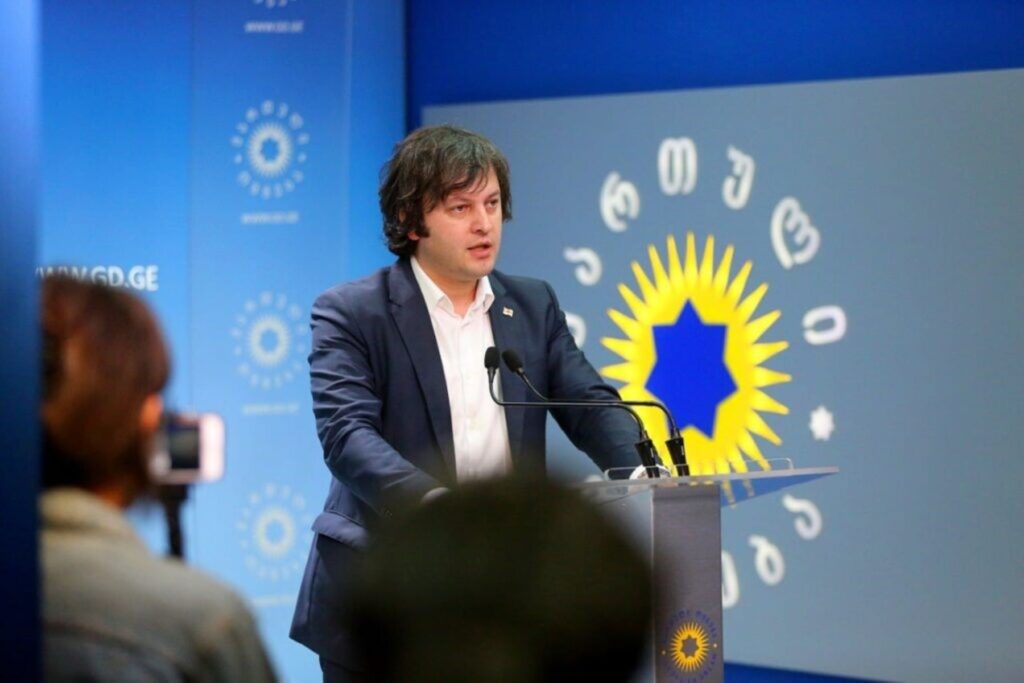Georgian Prime Minister Irakli Kobakhidze has announced that a grant programme financed from the state budget will be created for non-governmental organisations that have voluntarily registered as ‘organisations carrying out the interests of a foreign power’.
At a press briefing on Monday, Kobakhidze claimed that international donors had threatened to cut the funding of ‘many’ non-governmental groups if they chose to register. He did not name any specific donors in his statements.
Instead, Kobakhidze thanked the organisations that voluntarily registered in the database of foreign agents by the deadline of 2 September. After the passage of the foreign agent law earlier this year, NGOs and media organisations who receive more than 20% of their funding from abroad are obliged to apply for registration in the database, as well as hand over private documents, communications, and details of confidential sources to the government.
[Read more: OC Media refuses to register as ‘foreign agent’ in Georgia as government deadline passes]
At Monday's briefing, Kobakhidze claimed that details about the grant programme would be announced ‘in the near future’.
‘The necessary institutional and financial foundations for the smooth operation of the grant fund will be prepared in the next two months, and the first grant projects will be financed from January 2025. Detailed information about grant programmes will be shared with you in the near future’, he said.
According to the Prime Minister, the grant projects will be financed to fulfil the tasks determined by following the ‘interests of the Georgian people’.
‘The tasks include strengthening democratic institutions, fighting corruption, confronting hybrid threats, caring for people with disabilities, protecting the environment, protecting the rights and interests of ethnic and religious minorities, etc.’.
‘Non-governmental organisations that do good work and serve the interests of the Georgian people will receive [two] times more funding from the state budget than they received from foreign donors’, he claimed.
Kobakhidze did not name the specific number that will be provided from the state budget to finance NGOs, but said that they are talking about multi-millions in financing.
‘It is logical that non-governmental organisations operating with foreign funding, which neither try to create a political agenda in Georgia, nor participate in the implementation of revolutionary plans, nor try to shake the religious identity of the country, nor engage in LGBT propaganda, nor create artificial obstacles for the construction of strategic economic objects, do not hesitate to register [in the database of foreign agents]’, he said.
When asked by a reporter at the press conference to what extent an organisation funded by the government can be called a non-governmental organisation, Kobakhidze said that such organisations were currently funded by foreign governments, citing the National Endowment for Democracy (NED) as an example.
According to NED’s website, in 1983, they were ‘mandated by an Act of Congress as an independent, nonprofit, nongovernmental grantmaking organisation dedicated to strengthening democratic institutions and values around the world’.
‘The Act created a unique framework that ensured NED would be nongovernmental while receiving a Congressional appropriation subject to oversight and audit’, reads the organisation’s website.
According to Deputy Minister of Justice Tamar Tkeshelashvili, about 30,000 non-governmental organisations operate in the country, 1,200 of which are state-based. As of the 2 September deadline, 476 organisations had applied to register in the database.
Opposition members were quick to criticise the government initiative, stating that the ruling Georgian Dream party was attempting to take control of non-governmental organisations in the country.
‘With this, [Georgian Dream] wants to bribe the free non-governmental sector so that the voice of criticism will not be heard from their side’, said Roman Gotsiridze, the chair of the Eurooptimists parliamentary group.
‘The non-governmental sector is called non-governmental because it is free from the influence of the government and through it, the government is controlled by the public’, he added.
‘They are fighting the non-governmental sector because they want to extend their stay in power and loot the budget and have no one to control them’.
Nika Gvaramia, one of the leaders of the opposition Coalition for Change called the government’s initiative a ‘complete absurdity’, and ‘bribery of non-governmental organisations’.
The controversial foreign agent law was adopted on 28 May despite large-scale protests and calls from the country’s Western to abandon the initiative.




 9 September 2024
9 September 2024



